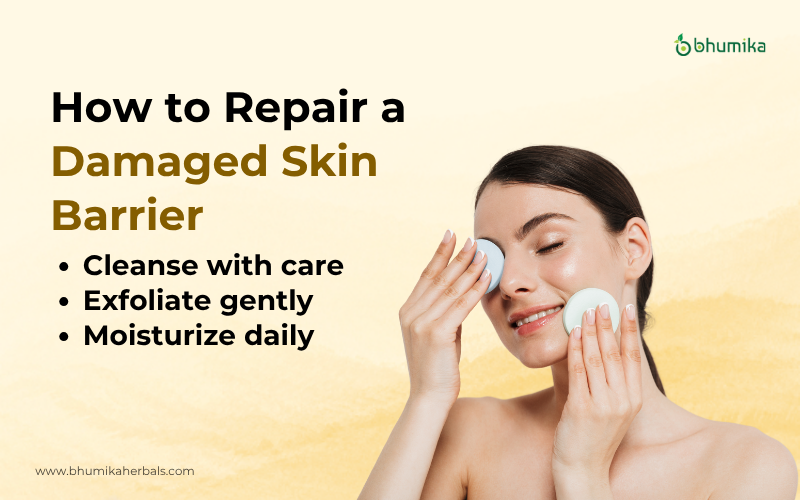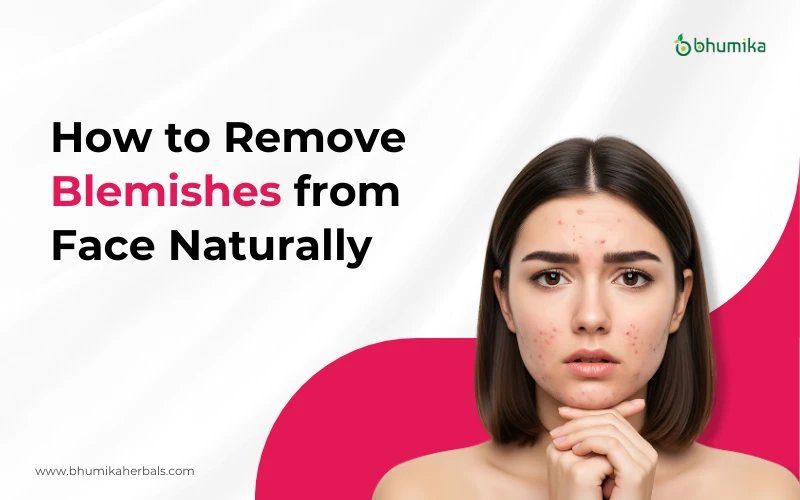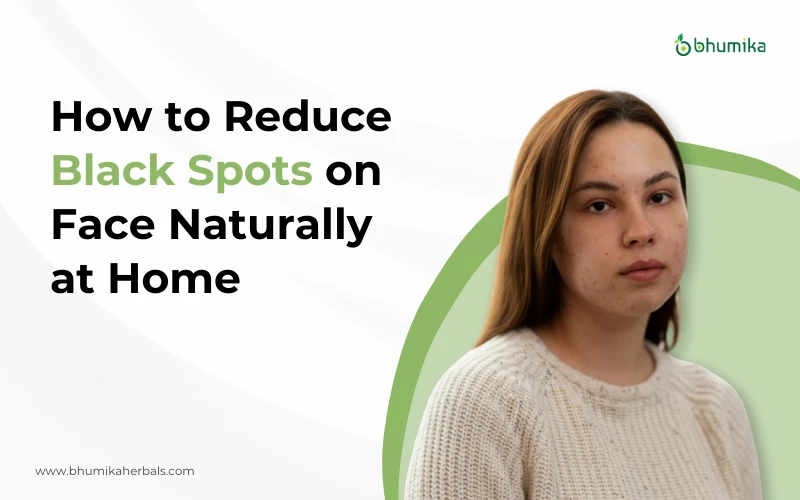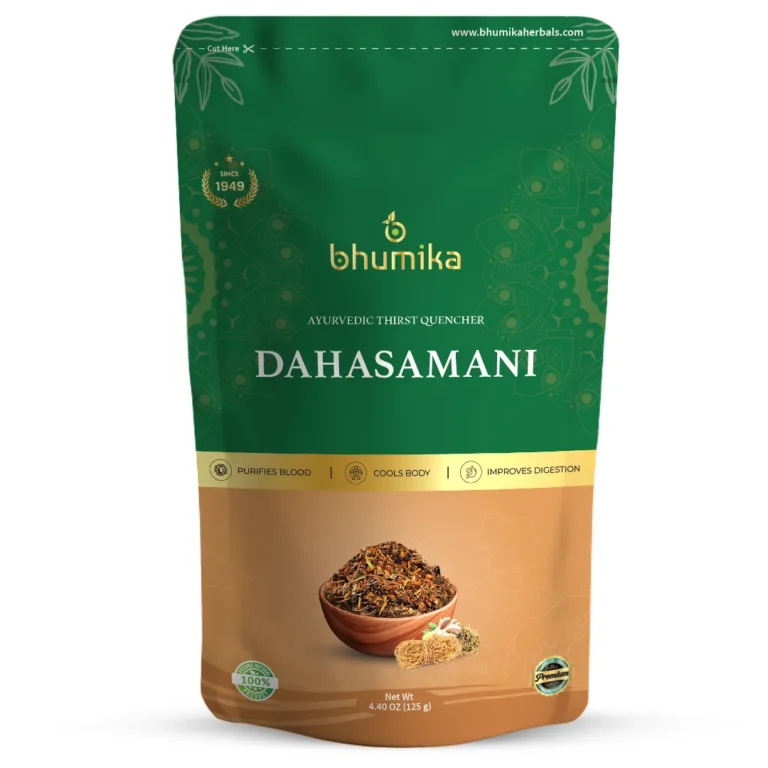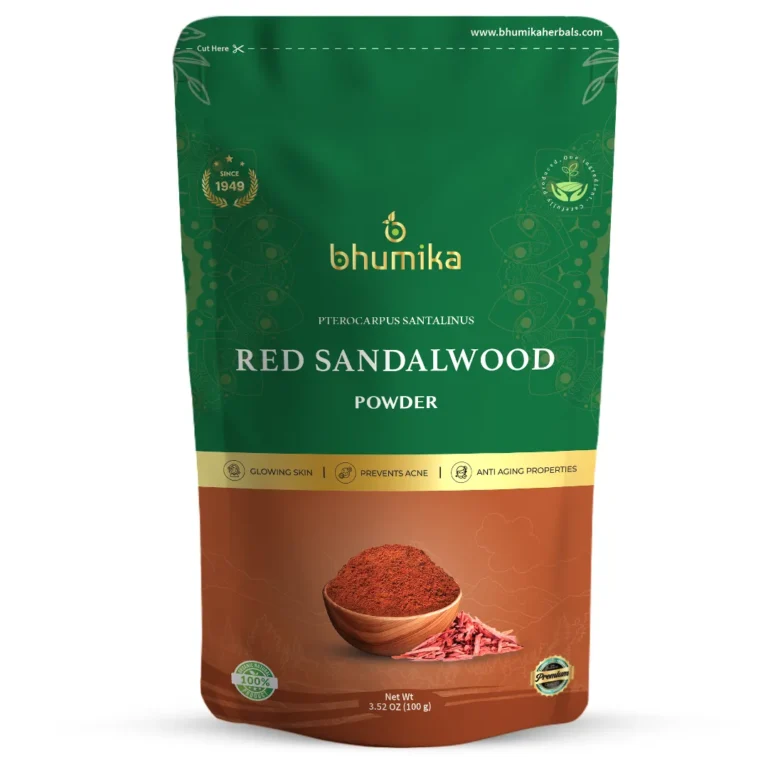Skin Barrier – What It Is & How to Repair It Naturally
Share this!
Skin barrier is a very common skincare term that we often hear now and then. Also, many people wonder how to repair it, protect it, or even recognise when it’s damaged. But not everyone knows what the skin barrier is. It is the outermost layer of our skin that protects us from pollution, irritants, and moisture loss.
If the barrier is healthy, skin will stay soft, calm, and hydrated. But when the skin barrier weakens, problems like dryness and sensitivity start to appear. Continue reading this article, as we will be discussing what a skin barrier is, its functions, how to repair a damaged skin barrier, and the best ways to care for it with everyday practices and the right skincare products.
What is a Skin Barrier?
Our skin consists of three main layers: the hypodermis, dermis, and epidermis, where each layer has smaller parts that perform specific jobs. The deepest layer is called the hypodermis, which supports muscles and bones. Dermis is the middle layer, which is responsible for blood circulation and sweat production.
The skin barrier is contained in the outer layer, called the epidermis. It acts like a protective shield, keeping your body safe from external harm. It also contains important nutrients like cholesterol, ceramides, and fatty acids, which help keep the inner layers of your skin nourished and hydrated.
Functions of Skin Barrier
The skin barrier can protect your skin by locking in moisture and keeping your skin away from unwanted substances like germs and irritants. Below are the key functions of the skin barrier:
- Prevents moisture loss: One of the significant functions of the skin barrier is to retain moisture, which will help keep your skin soft, smooth, and hydrated. It also prevents dryness, rough patches, and flakiness. Your skin can become dry, dull, and dehydrated when the barrier is weak.
- Protects against environmental damage: It acts as a shield against external stressors like UV rays, pollution, allergens, and toxins, which are also called free radicals. These free radicals can harm skin cells, cause pigmentation, premature ageing, wrinkles, and lead to reduced skin elasticity.
- Defends against germs: It prevents the harmful bacteria, viruses, and other pathogens from entering the body, reducing the risk of infections and skin problems.
- Maintains skin pH: The barrier can help balance the skin’s natural acidic pH. This will help retain moisture, keep harmful bacteria and fungi away, and support healthy microbes that benefit the skin.
- Supports skin structure: It can maintain the strength and structure of your skin, keeping it firm, plump, and youthful. If the barrier of your skin is damaged, there can be increased chances of skin conditions like eczema or psoriasis.
- Promotes skin renewal: A strong skin barrier will help heal and regenerate your skin. It supports the repair of skin cells, promoting a smoother, healthier, and even complexion.
Signs of a Damaged Skin Barrier
When the barrier of your skin is damaged, there are many ways in which it shows the symptoms, and they can even lead to various skin concerns. Here are some common symptoms of a damaged skin barrier:
Dryness, Flakiness, and Itching
If your barrier is not holding moisture properly, your skin begins to feel rough, tight, and flaky, and it often looks dull, lifeless, and uneven in tone.
Sensitivity and Irritation
A damaged skin barrier can make your skin more reactive. So, if you experience redness, burning, stinging, or itching after using skincare products or facing environmental triggers, these are clear signs that your skin’s protective layer needs repair.
Breakouts
When the barrier of your skin is damaged, bacteria and dirt can easily enter your skin and result in clogged pores, acne, or worsen existing breakouts.
Higher Risk of Infections
If the barrier is weakened, your skin may become more prone to bacterial or fungal skin infections.
Other Warning Signs
If your skin starts to feel tight even after moisturising it, or you notice rough patches, pigmentation, or uneven texture, it may indicate that your barrier is not working properly to keep your skin smooth and hydrated.
How to Repair a Damaged Skin Barrier
To restore the strength of a weakened skin barrier, you must follow a gentle but effective skincare routine. Here are some of the essential steps you can follow to repair a damaged skin barrier:
- Cleanse with care: You may use a mild cleanser that can remove the dirt, makeup, and excess oil without stripping off your natural oils.
- Exfoliate gently: Use a gentle exfoliant once or twice a week to improve skin texture and tone without irritating your skin.
- Moisturise daily: Look for moisturisers that contain ingredients like ceramides, hyaluronic acid, or centella asiatica (cica), which will help to hydrate, soothe, and strengthen your skin without making it too oily or dry.
- Protect with sunscreen: Always use a broad-spectrum sunscreen (SPF 30 or higher) to protect your skin from the sun, whether you are indoors, outdoors, or even on cloudy days.
Tips to Maintain a Healthy Skin Barrier
For the overall wellness of your skin, it is essential to keep your skin barrier healthy. Here are some simple tips you can follow to keep it strong and protected:
- Gentle cleansing: Use a mild, soap-free, and fragrance-free cleanser. To wash your face, use lukewarm water instead of hot water. Hot water can strip away your skin’s natural oils and weaken the skin barrier.
- Moisturise daily: You must choose a moisturiser that suits your skin type. Also, look for moisturisers that contain ingredients like ceramides, hyaluronic acid, glycerin, and shea butter that can help lock in moisture and support barrier repair.
- Sun protection: When exposed to the Sun, UV rays can damage your skin barrier, leading to early signs of ageing and skin problems. So, use a broad-spectrum sunscreen with SPF 30 or higher every day.
- Eat a balanced diet: Foods rich in antioxidants, vitamins (A, C, and E), and healthy fats can nourish your skin from within and improve skin barrier strength.
- Stay hydrated: It is essential to stay hydrated internally to keep your skin plump and healthy.
- Avoid harsh skin care products: Do not use skincare products with alcohol, strong fragrances, sulfates, or harsh chemicals, as they can irritate or break down the skin barrier.
- Don’t over-exfoliate: Over-exfoliation can weaken your skin barrier. Use a gentle exfoliant 1-2 times a week.
- Use a humidifier: If you live in a dry climate or spend time in air-conditioned rooms, you may use a humidifier that can add moisture to the air and prevent your skin from drying out.
- Stress Management: If you undergo high stress levels, it can affect your skin, too. So, involve yourself in practices like meditation, yoga, or deep breathing to keep your skin and overall health balanced.
- Visit a dermatologist: Regular checkups can help you understand your skin’s condition, and you can get personalised advice for maintaining a strong, healthy barrier.
Takeaway
The key to getting a strong and glowing skin is to keep your skin barrier healthy. When you understand the factors that damage it and follow simple, mindful habits, you can protect it from damage.
Using the right skin care products containing barrier-supporting ingredients and staying consistent with your routine, you can prevent moisture loss, protect your skin from irritants, and keep it balanced in the long run.
Related Topics
| Night Skin Care Routine | How To Remove Blackheads Naturally |
| How to Treat Eczema Naturally | How to Detox Skin |
Frequently Asked Questions on Skin Barrier
How to know if the skin barrier is damaged?
If your skin barrier is damaged, it may appear red, dry, or flaky, and feel tight or rough, even after applying moisturiser. You might also notice that your skin is more sensitive, with a burning feeling when using products. Other common signs can include frequent breakouts, inflammation, or flare-ups of conditions like eczema.
What causes the skin barrier to become weak or damaged?
The skin barrier can get weakened due to various external and internal factors. Common external causes include sun exposure, pollution, extreme weather, over-exfoliation, or using harsh products with alcohol or strong chemicals. Some of the internal factors, such as poor diet, not drinking enough water, lack of sleep, and stress, can also affect the skin’s natural repair system, making it more prone to damage.
How can I improve and maintain a healthy skin barrier?
You can improve and maintain a healthy skin barrier by following a simple and gentle skincare routine. Use mild, fragrance-free cleansers and moisturisers with ingredients like ceramides or hyaluronic acid. Do not over-exfoliate your skin, and always apply broad-spectrum sunscreen. Also, it is important to stay hydrated, eat a healthy diet, manage stress, and protect your skin from extreme weather or harsh chemicals.
About the Author
Vishnu Raj
Related Posts
Blemishes can appear as dark spots, acne marks, or red...Read More
Have you ever looked in the mirror, noticed those tiny...Read More
Today, we are busy with a hectic lifestyle, and it...Read More
Coriander is a kitchen staple that needs no introduction. Found...Read More
Did you know your skin creates its own natural oil...Read More
Split ends are one of the most common hair problems,...Read More
For generations, people have used and trusted castor oil to...Read More
We always dream of having smooth and clear skin, but...Read More
Share this!
Share this!
Shop by Concern
Acne & Pimples (9) Dandruff & Scalp Itchiness (6) Dark Circles & Puffy Eyes (4) Dead Skin Cells (6) Dehydrated Skin (4) Dry & Damaged Hair (5) Dryness (4) Dry Scalp (6) Dry Skin (4) Dull Skin (8) Excessive Oilness (4) Face Care (9) Fine Lines & Wrinkles (8) Greying (3) Hair Care (8) Hairfall (6) Hair Loss & Growth (6) Hyper Pigmentation (6) Sandalwood Products (3) Skin Brightening (9) Skin Care (8) Stretch Marks (3) Tanned Skin (5) Uneven Skin Tone/ Pigmentation (6) Uneven Skintone/ Texture (5)


